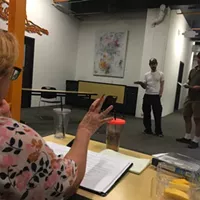Friday, April 15, 2011
Arts / News Review of CPCC's Sensoria
Posted By Perry Tannenbaum on Fri, Apr 15, 2011 at 12:09 PM
When you capriciously call a bunch of previously-scheduled arts events in your town an arts festival, you get a sprawling mess like Charlotte Shout was until it asphyxiated in 2008. Or if you coordinate a little more conscientiously but still fail to strictly define or actively publicize, your inchoate celebration coalesces into something like Rock Hill’s Come-See-Me Festival, still going weak in its 48th season.
Presented at Central Piedmont Community College and originally called ArtsFest, Sensoria has more going for it than the benefit of snappy branding. It has the coherence of a campus event, bolstered by the adornments of presenters who use CP’s new and refurbished performing arts venues. A couple of distinguished collaborators, namely NC Dance Theatre and the Bechtler Museum, have also pitched in this year on a couple of special Sensoria events. With Barry Lopez headlining the literary lineup, Sensoria has also gained some PR traction.
Festival lift-off occurred last Friday at 8pm when CPCC Opera Theatre and CPCC Theatre simultaneously premiered new productions. Not exactly in a festival spirit, Op Theatre presented Verdi’s Requiem at Halton Theatre while opening night of Almost, Maine brought its northern lights to Pease Auditorium. Spangled with seasoned soloists who have appeared before in various musical and opera productions at the Halton, ranging from Tosca and Madame Butterfly to Man of La Mancha and South Pacific, this Requiem could hardly be mistaken for a student production.
Most tested of the soloists I saw Friday night was soprano Rebecca Cook-Carter, who acquitted herself confidently in the climactic “Libera Me” while doubling as stage director. CP’s go-to Puccini tenor, Christopher Cameron (Cavaradossi in 2003 and Pinkerton in 2006), was arguably the most heroic singer, subbing for Todd Geer after the programs were printed and shining in the “Ingemisco.” Extra bonus: we didn’t have to pretend he was 40 years younger! Mezzo-soprano Loretta Crosthwaite, a comic delight as Ruth in last year’s Pirates of Penzance, proved more than worthy of being taken seriously, particularly in the “Recordare,” and Steven Jepson, whose exploits at Halton have ranged from Emile de Becque to Sweeney Todd, had no difficulty at all with the bass role.
Things weren’t quite so pleasing with the three choruses and the 57-piece orchestra that filled the stage – with an additional four trumpeters deployed to the balcony for the “Sanctus.” With that much firepower, CP should have sold tickets up yonder in the balcony instead of bunching us down in the orchestra near the stage. Sitting in Row H, I often found it impossible to judge Alan Yamamoto’s work at the podium because of the sonic overkill when all the instruments and voices combined.
On the other hand, sheer relief may have sweetened my pleasure when the choruses and the musicians deferred to the soloists.
Across Elizabeth Avenue at Pease Auditorium, Sue and I try to sit as close to the stage as possible, schooled by the inaudibility of The Piano Lesson, a disappointing headliner at the first Sensoria last April. We were therefore pleasantly surprised on Saturday night when a cast replete with less familiar names was nearly 100% audible in the middle of Row F. That’s fairly deep at panoramic Pease and about four rows beyond our comfort zone last year.
The great state of Maine is a humble modifier in the title of John Cariani’s whimsically rustic confection. Almost is a town in northernmost Maine, a friendly repairman explains, that “doesn’t quite exist.” Get it? In keeping with that quaint nebulosity, each of the nine loosely connected skits – one of them diced into three parts to frame the package – isn’t quite believable unless we contribute our winking acquiescence.
In one vignette, “They Fell,” the suspension of disbelief is relegated to an epidemic of slipping and falling that afflicts two longtime buddies. In “Getting It Back,” we must accept the surreal notion that, after an 11-year relationship, Gayle is literally giving Lendall back all the love he has given her, packed and sealed in a pile of heavy-duty trash bags. Simplest of all is the conceit of the framing skit that begins with shy Pete sharing a park bench with the demure Ginnette on this frosty moonless winter night. To get closer, Ginnette must merely circle the planet.
Greta Marie Zandstra beautifully directs a cast that actually showcases more newcomers than seasoned vets, deftly balancing the whimsy and the comedy throughout the evening while ensuring that we hear it. Pease does feel oversized for Almost after the Davidson Community Players’ version of 2009, but set designer James Duke resists the temptation of filling the stage with the various interiors and exteriors we’re taken to, giving the production a more spacious, outdoorsy ambiance. Duke’s idea of the northern lights is more flashy than breathtaking in his lighting design, but Zandstra decrees that they punctuate all the scenes for maximum comic or thematic effect.
In a way, the quaint circumnavigation motif between Geoffrey Denson as Pete and Emily Johnson as Ginnette sets up the kinship between the various long-arced stories that Cariani wants to tell in his mini-plays. Chaz Pofahl is the repairman, East, in whose backyard Glory (a nicely muddled Cathrine Berkowitz) camps out in order to observe the northern lights. The inevitability of their chemistry is sealed when we learn that the man she is trying to forget was named West. Amy Wada is buried in an abusive relationship as Marvelyn in “This Hurts” when she meets – and cures – Joshua Ozro Lucero as Steve, a goofball who has never experienced pain, even when Marv accidentally conks him with an ironing board.
Act 2 actually gets more textured after the artful pratfalls of Jim Esposito and Doug Stauter in “They Fell,” weathering a crisis in their best buddy-ship. Kelly Carter searches for a lost shoe – and some lost assertiveness – as Marci in “Where It Went,” while Larry Cunningham as her husband Phil searches for the reason why he has forgotten their anniversary. Memories of Cariani’s East and West are inevitable when Don McManus finds Pamela Coffman as Hope at his front door in “Story of Hope.” Seems like some decades have passed since this Man proposed to – and lost – his Hope, but now that same Hope has finally realized that he deserves an answer.
If that sort of loopy allegory intrigues you, the CP production of Almost, Maine will completely satisfy.
Speaking of...
-

The Moffett Restaurant Group Celebrates the 20th Anniversary of Barrington’s Restaurant
Oct 12, 2020 -
Cancer's better with a side of 'shrooms
Aug 7, 2020 -

The Art of Influence
Aug 2, 2020 - More »











